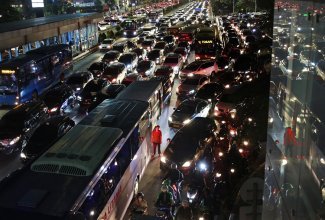
Passengers at a train station in Jakarta, June 2021.
While the idea has been around for decades, most thought it would never become a reality. But last January, Indonesia’s parliament passed a law to relocate the country’s capital from Jakarta to a new city in East Kalimantan province, more than 1,300 kilometres away, by 2024.
“It’s all happening very suddenly. We’ve heard about it for a long time, but it seemed impossible to us that it would ever happen,” Elly Rosita Silaban, chairperson of the Confederation of Indonesian Prosperity Trade Union (Konfederasi Serikat Buruh Sejahtera Indonesia, KSBSI), one of the country’s largest unions, tells Equal Times. “It’s going to cost a lot of money.” The government has estimated that relocation will require an investment of more than US$33 billion (about €29.7 billion).
Sukarno, Indonesia’s first president after it gained independence, first suggested relocating the country’s capital back in the 1950s. Current president Joko Widodo, popularly known as Jokowi, proposed it again in April 2019, arguing that the move would promote social and economic justice. “A capital city is not just a symbol of national identity, but also a representation of the progress of the nation,” he said while formally proposing the plan before parliament in August 2019. “This is for the realisation of economic equality and justice.”
Political and economic power in Indonesia, an archipelago of 17,000 islands, has traditionally been concentrated on the island of Java, home to 151 million people, 56 per cent of the country’s population of 270 million, along with roughly 60 per cent of its GDP and most of its manufacturing base. The Jakarta metropolitan area, which includes the capital itself as well as the cities of Bogor, Depok, Tangerang and Bekasi, is home to more than 30 million people. It is projected to reach 35 million by 2030 and overtake Tokyo as the world’s largest city.
Relocating the capital could have serious social and economic impacts on millions of workers living in and around Jakarta. “We still don’t know what will happen to the industries and employers currently located in the Jakarta metropolitan area,” says Silaban.
While workers in the capital city are mostly white-collar office employees and self-employed business owners, the conurbation is home to manufacturing centres for industries including textiles, construction, electronics, chemicals, machinery and food processing.
The workers in these manufacturing centres are more likely to be informally employed, as the government estimates that up to 60 per cent of the country’s workers do not have contracts or official labour recognition. “Many of the workers in the area that we’ve spoken with have said they are not willing to move because their families are in Jakarta. So the question becomes how to prepare them for the loss of their jobs, because these companies will eventually move,” she continues.
According to Silaban, the central government has not consulted the unions on how to ensure a less traumatic transition for the workers who relocate to the new capital as well as those who remain in Jakarta. “What will the future of these workers be?” she asks. “The government is not sitting down with us to discuss it.”
Lengga Pradipta, a researcher in human ecology at the Indonesian Institute of Sciences (LIPI), agrees that the government is not weighing the social impacts of relocating the capital. “Jokowi never mentioned the business owners, the students, the ordinary people. His focus has been on building infrastructure to relocate government employees,” says Pradipta, who is researching the social perceptions of relocation. “Lawmakers are ignoring the needs of the people, whether in Kalimantan or Jakarta.”
According to Pradipta, relocating the capital could negatively impact the economy of Jakarta, which would lose a significant portion of its population with the highest purchasing power, civil servants. At least 60,000 government employees and their families are expected to be relocated by the end of 2023. In 2019, then Administrative and Bureaucratic Reform Minister Syafruddin Kambo estimated that roughly one million civil servants working for the central government could ultimately be relocated. This could also result in the displacement of businesses and independent workers who, though not required to relocate, may be forced to do so by the departure of their main consumers. Pradipta gives the example of online sales services, whose biggest customers are government employees.
The economic impact could also spread to other parts of the country. “My main concern is that if the capital is relocated, the economy will slow down and never return to where it once was,” says Pradipta. “[Workers] fear for their future. They want to know what is going to happen, if their companies are going to close and if they will lose their jobs. They have no information,” she says.
A country without a climate emergency plan
Economic and population redistribution isn’t the only compelling reason for relocating the country’s capital. According to the World Bank, Indonesia is “highly vulnerable to climate change impacts, including extreme events such as floods and droughts, and long-term changes from sea level rise, shifts in rainfall patterns and increasing temperature.”
The coastal megacity of Jakarta is even more vulnerable. Rising sea levels are aggravating the city’s soil subsidence problem, originally caused by overexploitation of the region’s groundwater resources. “There are two compounding factors. One is geological conditions, as Jakarta is an alluvial area, and the other is water extraction,” Elisa Sutanudjaja, executive director of the Rujak Centre for Urban Studies, tells Equal Times. Jakarta is one of the world’s most rapidly sinking cities. It is estimated that a quarter of the city could be under water by 2050.
But according to Sutanudjaja, if the government was serious about addressing the problem, relocating the capital wouldn’t be necessary. “Jakarta is similar to Tokyo in the 1960s. They also had a problem with groundwater extraction, which they solved by stopping that extraction,” she explains. “If you really want to solve the problem, you have to address it, not displace it.”
According to Silaban of the trade union KSBSI, Jakarta’s problems aren’t the only element of the climate emergency that the government is failing to address.
“No one in Indonesia is interested in talking about just transition. We’ve been trying to put the issue on the table for years but they don’t want to talk about it,” she says.
Nevertheless, “KSBSI is planning, among other things, discussions with companies who are already affected by climate change.” The trade union has also pushed for climate change to be prioritised at the upcoming G20 summit in November, which could prove to be a significant event as Indonesia holds the G20 presidency this year.
In 2019, the Indonesian government released its emissions mitigation targets, committing to a 29 per cent reduction in greenhouse gases by 2030. Presented as part of its commitments made under the Paris Agreement, the government’s programme includes a small chapter on just transition, with general measures such as promoting low-emission economic activities that create jobs and improving worker training.
But as Silaban argues, concrete plans to help workers who will be affected by the energy transition have yet to materialise: “The people who are going to lose their jobs in the mining sector, for example, should receive support from the government to find other jobs.” One of the sectors likely to be hit hardest is coal, the main source of electricity generation in Indonesia and an important economic sector, as the country is the world’s largest exporter of coal.
KSBSI is demanding that the government “make a clear Employment Road Map based on the principles of the ILO Just Transition, as the phasing out of coal affects at least 165,784 workers in Indonesia.” According to the trade union, “East Kalimantan, the location of the new capital, is also the largest coal-mining province in the country. The lives of workers and their families will be doubly affected in this region […] by the new capital and by the closure of the mining industry.”
The main problem, Silaban says, is that public opinion in Indonesia generally doesn’t take the consequences of climate change seriously. “People have been hearing about the impact of climate change for so long and nothing has happened to them so far, so they think it never will. What they don’t realise is that a lot of the things that are already happening, like crop failures, are a direct result,” she explains. “This is serious because it’s slowing us down a lot at a time when urgent action is required.”












